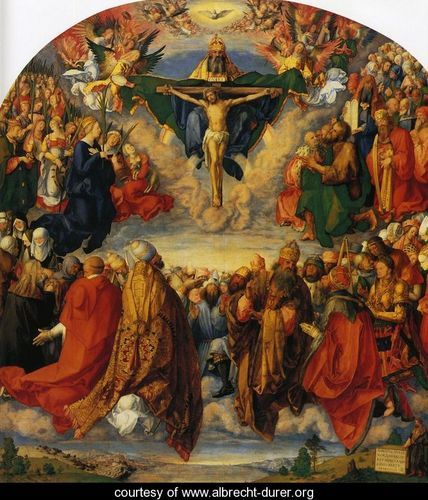 During the season of Lent we will be meditating upon Psalm 22. Psalm 22 is a Messianic Psalm. A Messianic Psalm is a Psalm about the Person and Work of Christ to save all men from their sins. Consequently, Messianic Psalms reveal to us not only the During the season of Lent we will be meditating upon Psalm 22. Psalm 22 is a Messianic Psalm. A Messianic Psalm is a Psalm about the Person and Work of Christ to save all men from their sins. Consequently, Messianic Psalms reveal to us not only the
physical suffering of Christ for our sins, but also His thoughts and feelings in the midst of His Passion. “Moorehead wrote ... ‘But [the Psalms] go deeper, as we may say; deeper even than the gospels; they let us into the thoughts and feelings when the billows of wrath were rolling over Him, when the heavy cloud of judgment which was all our own burst upon His devoted Head.â€Ââ€Â (The Rev. Dr. Raymond Surburg, Exegetical Essays and Materials Dealing with the Interpretation of the Psalms, p. 28, amplification and emphasis added)
Because the Psalms relate to us Christ’s own thoughts and feelings during His Passion, their descriptions of Christ’s Passion are vivid. The Rev. Dr. George Stoeckhardt writes, “Centuries, yes, a millennium earlier, before ever occurred what we read in the final chapters of the four Gospels, the prophets had spoken and written concerning Christ’s suffering and death and had related this grand story in such minute detail as though they themselves had been on the scene.â€Â (Christ in Old Testament Prophecy, tr. the Rev. Dr. Erwin W. Koehlinger, Ft. Wayne: Concordia Theological Seminary Press, p. 59)
And from Christ’s viewpoint in the midst of His Passion provided by the prophets, we see not hatred of His murderers, assassins, and tormenters coursing through His Righteous Mind, but mercy. “Father, forgive them; for they know not what they do.â€Â St. Luke 23:34.
Incomprehensible the love of God is that He would rather forsake God than sinful men. For in Psalm 22 we see dramatically that God chooses rather to forsake God than sinful man in order to save men from their sins.
God’s forsaking of God for the sake of fallen men manifests not only the Power of the Almighty God, but also His deep and abiding love for fallen men because God would rather forsake God than forsake and condemn men, and rightly so, for our sins.
Because God forsook Christ for the sins of all men, then we know that no man is ever forsaken of God.
And, although forsaken of God, Christ remained obedient to God throughout (Passive Obedience+). For Christ did not curse God and die as Job’s wife suggested to the suffering Job (Job 2:9), but rather called Him, “My Godâ€Â, in the midst of God abandoning Him. Jesus, therefore, continued to fulfill perfectly all righteousness (Active Obedience) even in the midst of the depths of hell.
Through this perfect obedience to God’s commandments and will, Jesus burst the gates of hell for all men. The Rev. Dr. George Stoeckhardt writes, “Yet, while Christ knows Himself totally forsaken of God in the abyss of hell, He cries, 'My God, My God!' Even in such an abject condition, as He was in, He still clings to God as His personal God. This was a God-pleasing prayer that as it were issued from the pit of hell. This is something extraordinary, something unheard of. In the midst of the torments of hell Christ asserts that as His Son He will cling to God and claim Him as His own! Never before and never after has such a confident prayer issued from the abyss of hell on the part of those who are damned in that place. Ordinarily from those who suffer the torments of the damned come only cries and sighs of despair, never prayers of faith. It was by this prayer that Christ conquered and overcame the power of hell.â€Â (Lectures on Select Psalms, tr. the Rev. Dr. H. W. Degner, Ft. Wayne, IN: Concordia Theological Seminary Press, p. 67, underscore added)
Finally, Christ completed His suffering and rose from the dead on the Third Day in order to preach the Gospel to His brethren, the Church, and through that Gospel deliver the benefits of His suffering to all men and gather His Church. “I will declare thy name unto my brethren: in the midst of the congregation will I praise thee.â€Â Psalm 22:22. Luther writes, “Had Christ been crucified a hundred thousand times and had nothing been said about it, what profit would the act of His being brought to the cross have brought? But when I come to this, I must draw this act into history and publish it for all the world. Also, if anyone had seen this, he would not have thought that the work of redemption was taking place there. The work is fulfilled on the cross, but no one knows of the redemption except the Father and the Son. Therefore to the act also the use of the act must be added, that it may be declared through the Word and that one may hold it by faith and, thus believing, may be saved.â€Â Luther’s Works, Vol. 28, p. 268.
Vespers
Ash Wednesday
Lent I
Lent II
Lent III
Lent IV
HOLY WEEK
Palm Sunday
Maunday Thursday
Good Friday
|
|
|